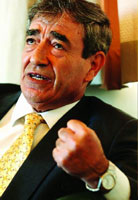| Home / International / International -- Cultural Sidelines | Tools: Save | Print | E-mail | Most Read |
| Jews Will Never Forget Harbin: Envoy |
| Adjust font size: |
However, this is his sixth visit to He has a deep attachment for this northern city, which once provided shelter for thousands of Jews fleeing from atrocities. " This strong bond originates from a time in history Jews will never forget. From the late 19th to mid 20th century, more 20,000 Jews fled to They were treated well in "The Chinese and Jews built a deep friendship here, and it has received worldwide recognition," Qu said. Though Haim has no close ties with "What The Huangshan Jewish cemetery in the city is the biggest in the The incumbent Prime Minister Ehud Olmert paid a visit to his father's grave in the cemetery in 2004. Though all the Jews who once lived in As a Jew and an ambassador, Haim said he is doing his best to encourage "I take every opportunity to tell Israelis that there is a city, With his help, an Israeli company built greenhouses in the province last year. Another company is planning to invest in a dairy farm. Haim said he recently introduced an Israeli businessman to government officials of That is only the first stage of potential investments amounting to 10 billion yuan, he said. "I have fulfilled my job," said Haim, who will end his tenure in the country this summer and return to He said he might take up a teaching job and probably write a book about "Of course, I will come to ( |
| Tools: Save | Print | E-mail | Most Read |
 |
| Related Stories |
| A Novel to Tell Stories of Jews in Shanghai During WWII |
| We're Grateful for China's Help: Jews |
| 85-year-old Synagogue Marks Chinese-Jewish Friendship |
| Jews Return to Childhood Homes |
 |
 |
|
 |
| Links |
